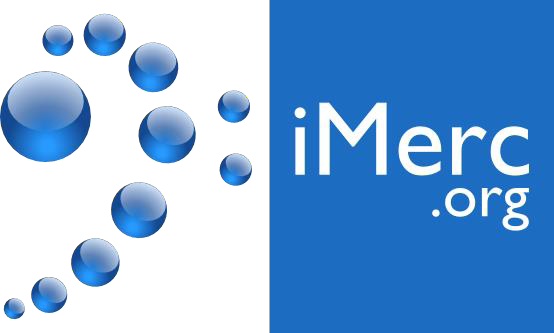

UCL iMerc Newsletter — Vol. 6, March 2024
About us
Since the Covid-19 pandemic in 2020, we have been meeting regularly to share new research and insights related to diverse topics in music education, broadly conceived. We are a group of researchers at doctoral and post-doctoral levels, as well as senior researchers, with a shared curiosity and interest in advancing basic and applied research. Our monthly seminars are also designed to foster a sense of community amongst colleagues who are mainly based in the UK, mainland Europe (such as Portugal, Germany, Greece), Asia (China, including Hong Kong) and Australia. Opportunity is taken each month to update current research projects and also to listen to the latest research from our invited speakers. If you would like to know more or to join us, please contact us.
Our upcoming research seminar is on Wednesday, 20th March 2024, 11.00-13.00 UK Time. It will be held on Zoom and in either room 943 or room 938 at the IOE. We are very happy to have Dr Olcay Muslu, our guest speaker, and colleagues Kate Laurence, Dr Ross Purves, Sandra Oberoi, and Stephanie Chan speak to us. Please join us by clicking the Zoom link HERE. Everyone is welcome!
In This Issue

Previous iMerc Research Seminar, February 2024
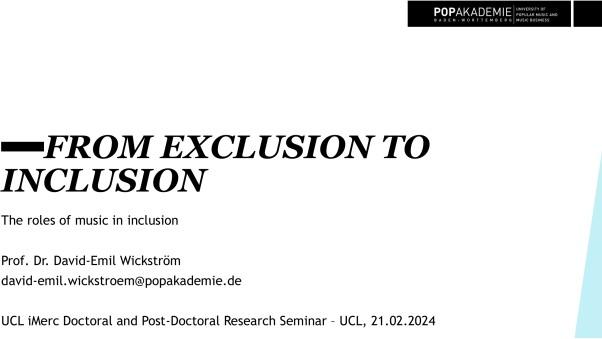
1 - Presentation cover slide presented by Professor David-Emil Wickström
Professor David-Emil Wickström (david-emil.wickstroem@popakademie.de) guided us in reflecting on how musical content relates to the cultural complexity in kindergarten and school contexts in Central Europe. The presentation was titled From Exclusion to Inclusion—The Roles of Music in Inclusion. The musics and religions in a class or group were similar to a language that was a semiotic system that had to be learned.
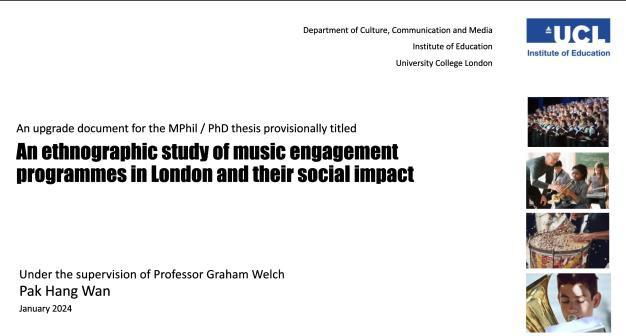
2 - Presentation cover slide presented by Pak Hang Wan
Pak Hang Wan (pak.wan.20@ucl.ac.uk) updated us about his PhD project. The presentation was titled, An Ethnographic Study of Music Engagement Programmes in London and Their Social Impact. In this presentation, Pak explored the inner workings of music engagement programme providers in some of the most socially diverse areas in London. Pak also shared his insights on discovering music practitioners' authentic attitudes and how they navigate an ecology of social change and government policies.
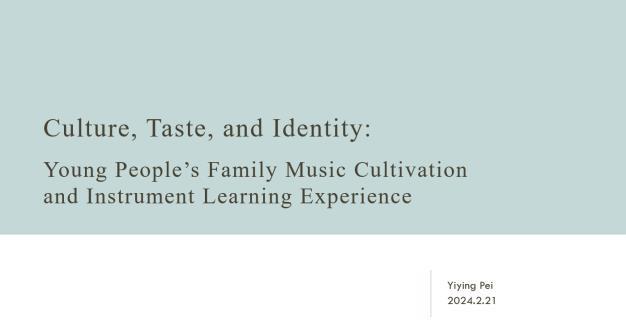
3 - Presentation cover slide presented by Yiying Pei
Yiying Pei (peiyy1223@163.com) is visiting us from China for several months and shared her doctoral study. Her presentation was titled Culture, Taste, and Identity: Young People’s Family Music Cultivation and Instrument Learning Experience. In this ealier Masters-based research presentation, Yiying guided us to understand the phenomenon of instrumental learning in China. Through semi- structured interviews under narrative inquiry, Yiying discovered that instrument learning is a strategy of cultural reproduction which helps pass on cultural capital through the family in a hidden or conscious way. Parents’ participation, expectations, and decisions on children’s education affect the way of reproduction.
Event: 'Stonehenge', Premiere in London
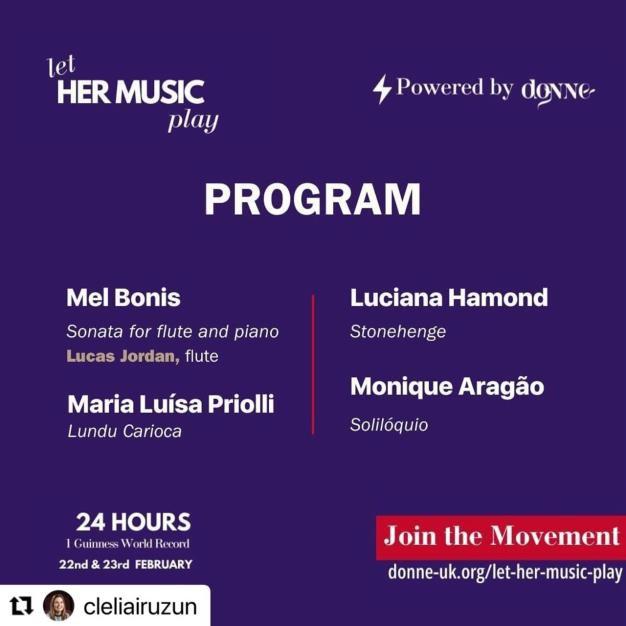
4 - The repertoire Clelia Iruzun chose to play
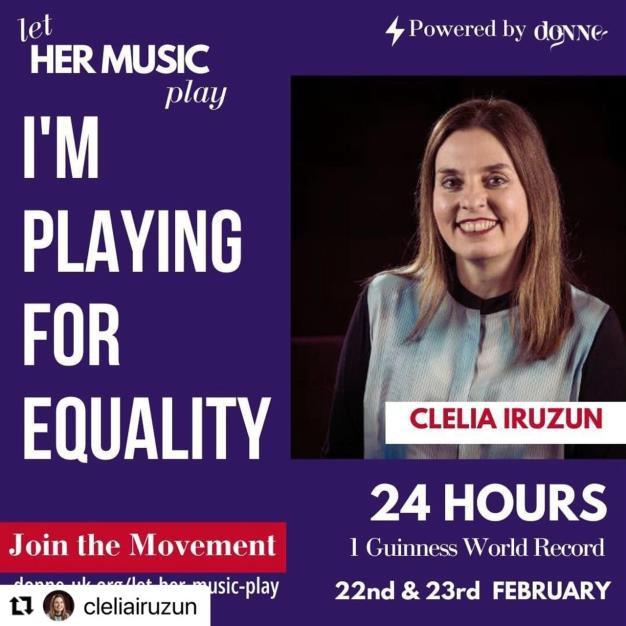
5 - A Picture of Clelia Iruzun
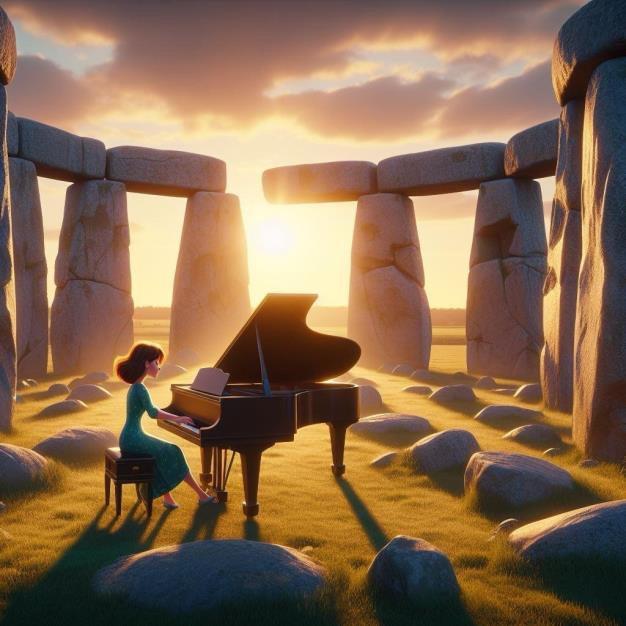
6 - AI picture: Stonehenge and a woman pianist by Dr Luciana Hamond
Dr Luciana Hamond is a former PhD student in Music Education at the IOE, UCL. Her doctoral study was supervised by Professor Graham Welch and Professor Evangelos Himonides.
Premiere in London - Stonehenge composed by Luciana Hamond
On February 22nd 2024, the Brazilian pianist London-based Clelia Iruzun performed and premiered “Stonehenge” by former doctoral student Luciana Hamond in the Embassy of Brazil in London. Watch HERE.
This is for the Let HER MUSIC Play event organized by Donne UK, which has the founder of the Brazilian singer, London-based Gabriella Di Laccio. Stonehenge is a meditative and improvisation- based piano music composed by Luciana Hamond in 2016. Clelia is a very dear friend of Luciana, and they first met in London when Luciana was living and studying for her doctorate. The sheet music of Stonehenge can be ordered HERE. Luciana Hamond's piano music can be listened to on Spotify HERE.

7 - A picture of Dr Luciana Hamond
Luciana Hamond (luhamond@yahoo.com)
Dr. Luciana Hamond works at the Department of Arts at the Federal University of Mato Grosso (UFMT), Cuiabá (Brazil), working in the areas of Piano and Music Education. She completed her PhD in Music Education from the Institute of Education at UCL, London, England, and received a CAPES Full Doctorate Scholarship abroad. She pursued her postdoctoral at the State University of Santa Catarina (UDESC) in collaboration with Dr Anna Rita Addessi from the University of Bologna (Italy), using MIROR technology for piano improvisation. At the moment, Luciana is the Coordinator of the Undergraduate course in Music Education. Luciana is also the leader of the Piano and Technology research group (PIANOTEC) registered with The National Council for Scientific and Technological Development (CNPq). She is interested in the areas of piano pedagogy, piano performance and improvisation, digital technologies in face-to-face and online piano teaching and learning, and qualitative methods in music education.
ISME Café Online 2024: Exploring Research in Early Childhood Learning
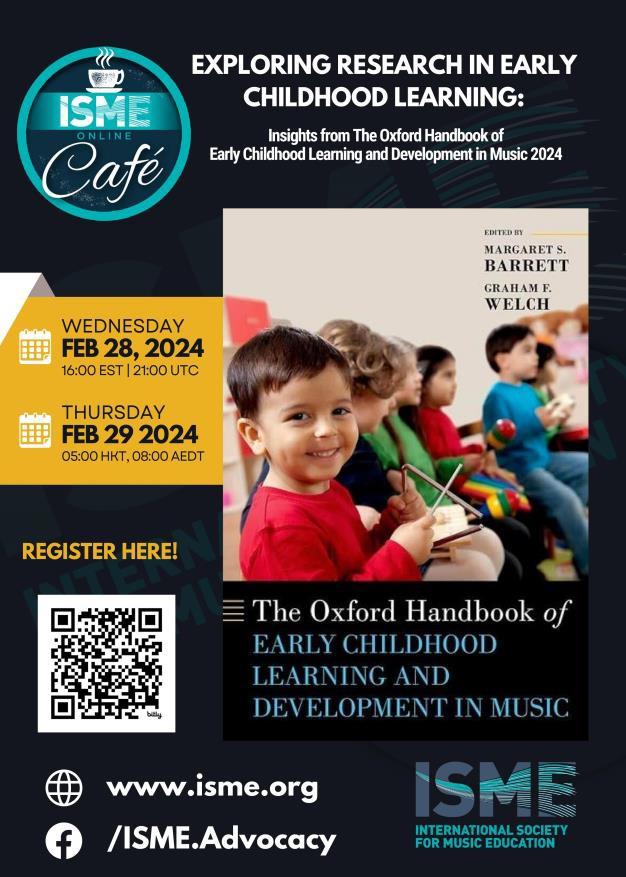
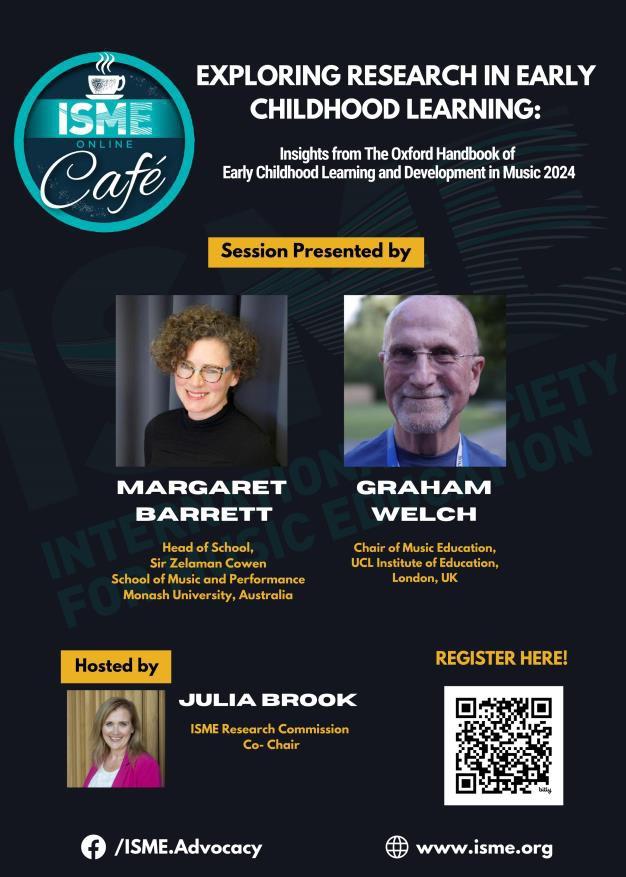
Recording on the ISME Café- Exploring Research in Early Childhood Learning: Insights from The Oxford Handbook of Early Childhood Learning and Development in Music, 28 February 2024. Recording is available HERE.
Hosted by: Julia Brook, Co-Chair; ISME Research Commission Presenters: Professor Margaret Barrett and Professor Graham Welch (Editors). To learn more about ISME or the ISME Cafe Online Series - go to www.isme.org
Campaign: Children's Media Submit '24

8 - Notes on Childen's Media Submit '24
Featuring: Dr Gregory Boardman
As an executive member of the Children’s Media Foundation (CMF), Dr Gregory Boardman has been dedicated to supporting the organisation’s recent Children’s Media Summits. You can read Gregory’s report on the event HERE.
At the Children's Media Summit on February 28th 2024, the Foundation launched a campaign to persuade the UK government to take action to address the huge shifts occurring as children and teenagers migrate to new and unregulated video-sharing platforms where very little UK public service content features in their media diet. You can voice your support for this important campaign by signing the document on the CMF’s website HERE.
For those with an interest in children’s media, the CMF organises an annual conference, the Children’s Media Conference, every July in Sheffield, England.
Contact: Dr Gregory Boardman (gregory.boardman.15@ucl.ac.uk)
Newly Published: Rethinking the music curriculum theories: Towards an updated comprehensive student-centred approach
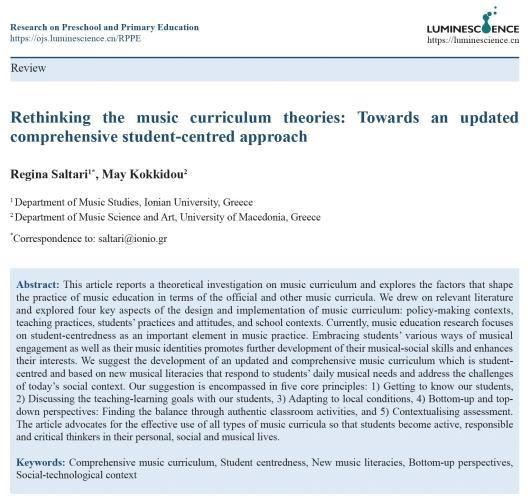
Authors: Dr Regina Saltari, Dr May Kokkidoou Abstract:
This article reports a theoretical investigation on music curriculum and explores the factors that shape the practice of music education in terms of the official and other music curricula. We drew on relevant literature and explored four key aspects of the design and implementation of music curriculum: policy-making contexts, teaching practices, students’ practices and attitudes, and school contexts. Currently, music education research focuses on student-centredness as an important element in music practice. Embracing students’ various ways of musical engagement as well as their music identities promotes further development of their musical-social skills and enhances their interests. We suggest the development of an updated and comprehensive music curriculum which is student-centred and based on new musical literacies that respond to students’ daily musical needs and address the challenges of today’s social context. Our suggestion is encompassed in five core principles: 1) Getting to know our students, 2) Discussing the teaching-learning goals with our students, 3) Adapting to local conditions, 4) Bottom-up and top-down perspectives: Finding the balance through authentic classroom activities, and 5) Contextualising assessment. The article advocates for the effective use of all types of music curricula so that students become active, responsible and critical thinkers in their personal, social and musical lives.
Reference: Saltari, R. & Kokkidou, M. (2024). Rethinking the music curriculum theories: Towards an updated comprehensive student-centred approach. Research on Preschool and Primary
Education, 2(1), 8–19. https://doi.org/10.55976/rppe.2202412048-19
Contact: Dr Regina Saltari (regina.saltari@uclmail.net)
iMerc Research Seminar, March 2024
Guest Speaker: Dr Olcay Muslu
Topic: System Reset! Rebuilding Music Education Before and After the Earthquake in Hatay, Türkiye
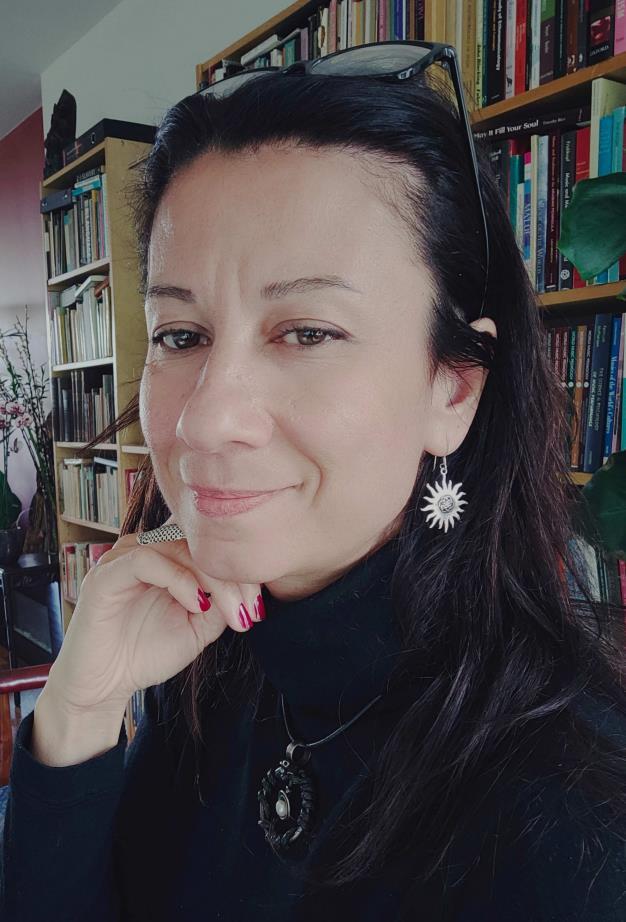
9 - Guest speaker: Dr Olcay Muslu
Guest Speaker: Dr Olcay Muslu (O.Muslu-Schippers@kent.ac.uk)
Dr Muslu is the Founding Chair of the Board of MİRAS Centre for Cultural Sustainability (www.miras.org.tr) and its Chief Executive. In the last 25 years, she has held various positions in and outside the academy as an educator and culture and art coordinator, using formal and non-formal education models to educate young musicians, dancers, music experts, and industry professionals.
Olcay Muslu completed her undergraduate and graduate studies at Istanbul Technical University and her doctorate in Musicology and Music Theories Program at the Istanbul Technical University Social Sciences Institute. Muslu is a founding member of the Hatay Mustafa Kemal University Antioch State Conservatory, where she has been an Assistant Professor between 2017-2022. Dr Muslu was the first recipient of the Visiting Scholars Scheme to be jointly supported by University College London (UCL) and the British Institute at Ankara (https://biaa.ac.uk/) and was hosted by the SOAS University of London in 2019. In 2023, she was co-opted as an Executive Board Member of the ICTMD, The International Council for Traditions of Music and Dance.
In the last ten years, she has been carrying out projects focused on cultural sustainability in Anatolia and the southeast of Turkey. She continues her academic work in the fields of applied ethnomusicology, intangible cultural heritage, music in higher education, performance, and sustainability both at home and abroad. Dr. Muslu gives conferences, lectures, and workshops both nationally and internationally.
Olcay's abstract:
Most of our work in education takes place in relative stability. Formal education is quite carefully regulated in most constituencies. Even innovative projects tend to operate within well-defined parameters. However, when I was asked in 2017 to set up a new State Conservatory and develop a curriculum for Turkish traditional music at Hatay Mustafa Kemal University (HMKU), it seemed like a very exciting endeavour. Hatay is in the Southeast of Türkiye, near the Syrian border, and the infrastructure for higher music education in the area was largely underdeveloped. This proved the beginning of an adventurous trajectory, where intellectual deliberations on aspects of curriculum within the strict guidelines of the University and Turkish Council of Higher Education authorities alternated with very pedestrian tasks, like gathering desks from different faculties across campus to enable us to teach in our temporary abode in the University’s stadium. With a great deal of creativity and flexibility, the first batch of students graduated in August 2022.
Then, a few months later, the 6th February 2023 force 7.8 earthquake devastated Hatay. Many students and teachers of the University passed away (including a number from our Conservatory); virtually everybody lost people close to them, and most of their homes. Coming back to Hatay two weeks later, I decided that there were very different priorities for music education in this area. While our concern had been with increasing knowledge of maqam and instrumental skills, it was clear that the greatest need now was going back to the basis of what music is and means: setting up an infrastructure that can help the survivors regain a sense of well-being, of community, of connection to place. From this thinking, the NGO MİRAS Centre for Cultural Sustainability was born, which contributes to delivering classes, offering workshops, supporting musicians, and enabling industry professionals to “rebuild beyond bricks” as Hatay slowly rises from its ashes, as it has done several times over the past 2,000 years.
In this presentation, I will explore the forces that governed my work based on data obtained from fieldwork, evaluate past and recent works on cultural policy and applied ethnomusicology, and discuss the outcomes of several projects that were conducted. The priorities in music education before and after the earthquake in formed will be presented by my model of musical sustainability in Türkiye (Muslu, 2022).
Reference: Olcay, M. (2022). UNESCO-Based and UNESCO-Free: Governmental and Non- Governmental Efforts for Safeguarding Intangible Cultural Heritage in Turkey. In: H. Schippers and A. Seeger, (eds.), Music, Communities, and Sustainability: Developing Policies and Practices, pp. 118-138. Oxford University Press. https://doi.org/10.1093/oso/9780197609101.003.0007
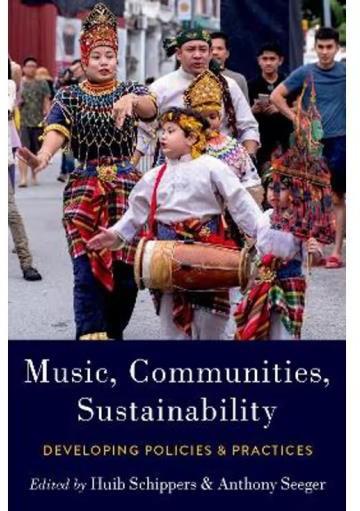
Speaker: Kate Laurence
Topic: A narrative study of veteran classroom music teachers’ professional learning
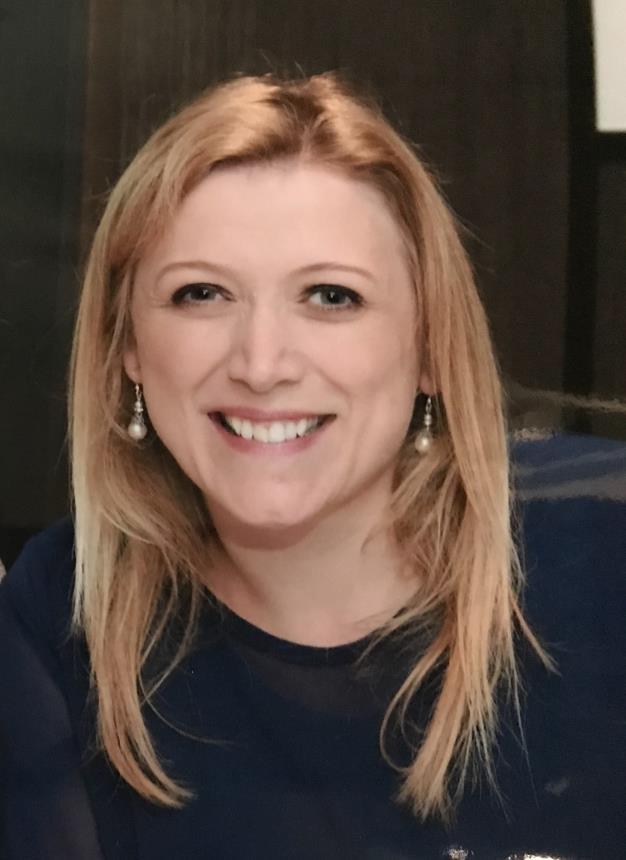
- Speaker: Kate Laurence
Speaker: Kate Laurence (k.laurence@ucl.ac.uk)
Kate Laurence is the Subject Course Leader for the UCL PGCE Music programme. She is responsible for the Initial Teacher Education (ITE) of classroom teachers across the secondary school age range.
Kate’s professional career has involved teaching in different contexts, including London schools, community settings and Higher Education. Prior to taking up her role at UCL, she was Director of Music at The St Marylebone School, later becoming Assistant Headteacher. During her school teaching career, Kate was awarded Advanced Skills Teacher status, a role that enabled her to support Heads of Music and develop large ensembles for young people in Local Authority secondary schools.
Kate has broader experience in leading professional learning programmes and CPD for teachers in England and Wales. She has recently worked with universities and schools in Sweden.
Kate has particular interests in narrative research, teacher professional learning, and music education. Her PhD research explores the professional learning of veteran teachers through a narrative storytelling approach.
Kate's abstract:
This study examines the professional learning of veteran school music teachers, based in English secondary schools, over the course of their careers.
The research engaged three experienced music teachers in a narrative storytelling process throughout the period of an academic year. The analyses were co-constructed as part of an iterative meaning-making process between researcher and participant. Music teacher professional learning was examined in the past and present: firstly, through stories of the participants’ teaching careers, set against the historic backdrop of changes in the education landscape and, secondly, through the narrative storytelling process itself which appeared to stimulate and provoke further critical reflection.
The research explores the three veteran music teachers’ act of storytelling to communicate and make sense of moments and events in their careers, including the way that literary devices and metaphors potentially amplified, subjugated or obscured meaning in their narratives.
The research uncovers how common narratives from the wider music teaching community, such as professional isolation and subject distinctiveness, are rehearsed by music teachers to potentially retreat from more difficult areas of their work. The emergent data reveal the serendipitous and unplanned nature of professional learning, specifically how non-formal sites of learning might offer an alternative space for music specialist teachers to stimulate and address areas of their practice.
Speakers: Dr Ross Purves, Sandra Oberoi, Stephanie Hoi-Ying Chan
Topic: Two sides of a coin: The influence of the British Empire on music education in India and Hong Kong
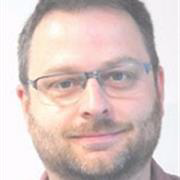
Speaker: Dr Ross Purves (r.purves@ucl.ac.uk)
Dr Ross Purves is Associate Professor for Music Education at the UCL Institute of Education. For details, see Ross's UCL profile, https://profiles.ucl.ac.uk/49590-ross-purves
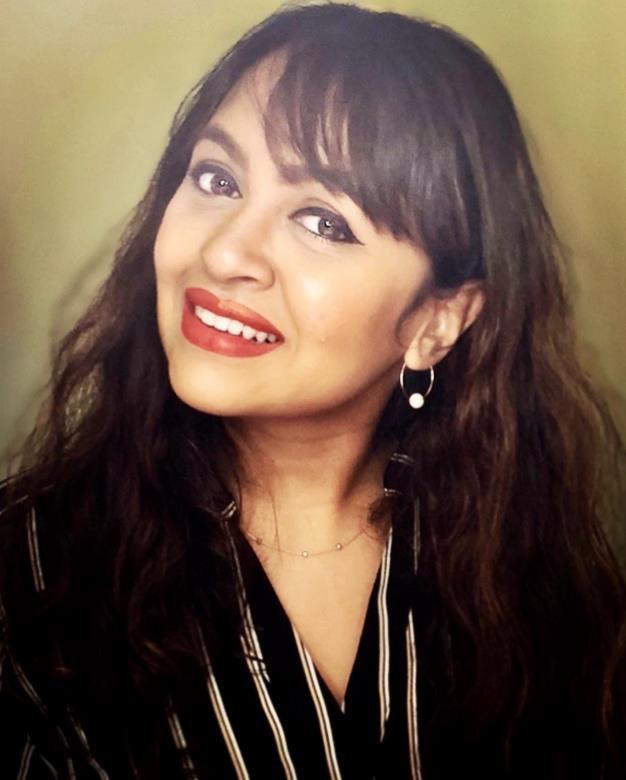
- Speaker: Sandra Oberoi
Speaker: Sandra Oberoi (sandra@harmonybangalore.com)
Founder and Director of Harmony-The Music School in India and Artistic Director of the award- winning choir 'The Harmony Chorus', Sandra Oberoi is a music educator and researcher, vocal coach, singer and amateur. She is committed to empowering people through creative musical experiences. Her research interests are music and creativity, adolescent voices, philosophy of music education, continuing professional development, music and social justice. She is presently a research student at the Institute of Education, UCL, in London. Sandra serves on the ISME Executive Board, Chair of the ISME Advocacy Committee and NATS India Chapter President.
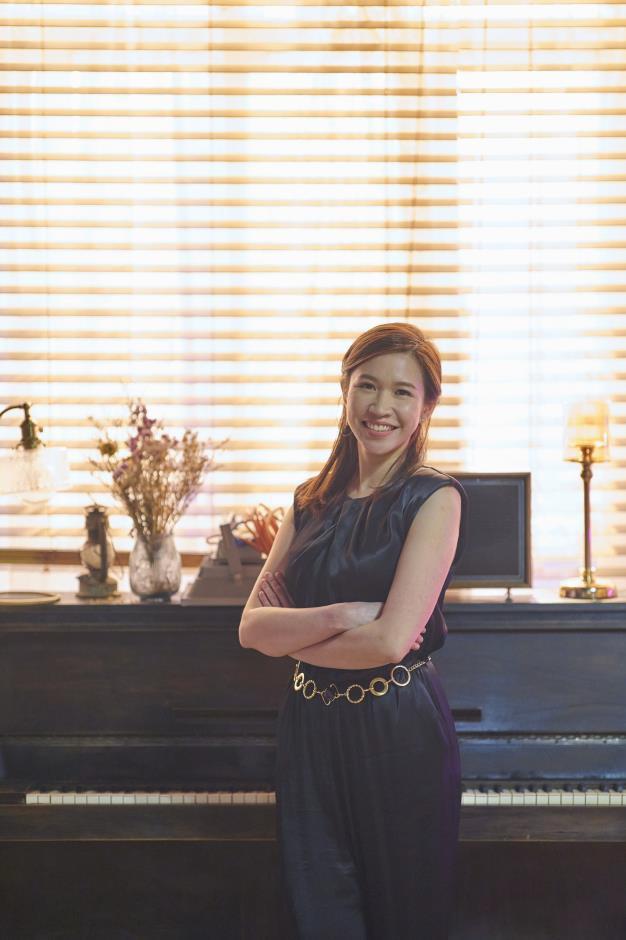
- Speaker: Stephanie Hoi-Ying Chan
Speaker: Stephanie Hoi-Ying Chan (stephanie-chan@ucl.ac.uk)
Stephanie Hoi-Ying Chan is a PhD candidate in Music Education, postgraduate teaching assistant and research assistant at the Institute of Education (IOE), UCL's Faculty of Education and Society. She is an Associate Fellow at the Higher Education Academy. Under the supervision of Dr Jo Saunders and Professor Graham Welch, Stephanie’s doctoral research explores lived experiences of primary music teachers in Hong Kong and their professional identities. She was awarded research grant from the UK Government’s Turing Scheme to support her research work in Hong Kong. Stephanie also works as a member at the IOE Research Ethics Committee. Her role includes reviewing research ethics applications for academic staff and developing research ethics and governance at the IOE.
After completing an MA in Music Education at the IOE, Stephanie worked as a primary teacher in Hong Kong (2018-2021), specialising in teaching and learning of Special Educational Needs (SEN) pupils. Her strong passion and vision in promoting social equality in education led her to a research assistant role (2023-204) in an international research charity, BRAVO VICTOR, for various research projects in the UK. Stephanie’s research interests include music teacher’s identity, musical development in children and adolescents, national identity and school music curriculum and curriculum development.
Ross, Sandra and Stephanie's abstract:
What counts as music education in India and Hong Kong, two colonies of the British Empire, yet vastly different? In India, colonial functionaries have intervened using the tropes of evangelisation and civilisation in different regions following varying timestamps. Being diverse in terms of caste,
tribe, class, ethnicity, language, and religion, seamlessness of a standardised music curriculum seems unattainable. For Classical Music and Popular Music in a formal space, this is largely shaped by the offerings of UK examination boards, introduced in India a little after English became the official language in 1837. India remains a land of dichotomy, grappling with ideologies introduced by the present government in power. For formal music experiences, the resulting accountability becomes progressively complex and fragile in the sometimes pedantic approaches, and especially as we begin to locate whose music and whose ideas are being included? On the contrary, as a small city that was part of China, the British colonisation created an opportunity for Hong Kong to develop and create its uniqueness. In the mid-1800s, the education system began with British missionaries sharing similar purposes in India for evangelisation and civilisation. Government schools were established by the colonial government a few years later modelled with the British education system, including music education. At present, music education in Hong Kong remains Westernised and it is evidenced that it is largely a result of the British colonisation. In this paper, we examine the development of present music education in India and Hong Kong from a historical perspective and subsequent impacts of British colonisation in music with documentary analysis. This presentation argues that the impacts of British colonisation in India and Hong Kong do not happen only during colonisation but also in present time.
In Conversation with Dr Cindy Yee-Ni Tse
Dr Cindy Yee-Ni Tse recently passed her PhD viva at UCL. Here is the conversation with Dr Cindy Tse (Right) and Eunice Tang (Left) at the Senate House Library.
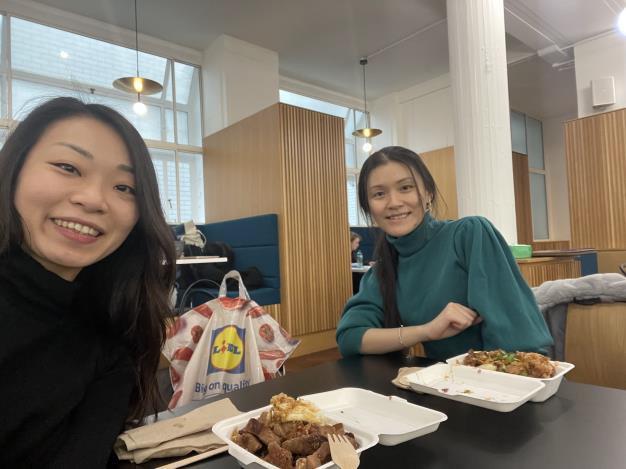
- Dr Cindy Yee-Ni Tse (Right) and Eunice Tang (Left) at the Senate House Library.
Would you please tell us a bit about yourself?
My name is Cindy (tseyeeni@gmail.com). I started my PhD a number of years ago, looking at Graded examinations, particularly in the context of Hong Kong instrumental teaching and learning. I graduated from the Royal Northern College of Music (RNCM), then I attained my Master’s of Music there [at RNCM] and then a Master of Music Education at UCL, and finally my PhD here [at UCL]. My major was in piano. I teach Chinese instruments, Western instruments and music theory. And I also teach as a Postgraduate Teaching Assistant (PGTA) at UCL.
Can you briefly tell us about your thesis?
My thesis is about graded examinations, their influence and impacts on instrumental teaching and learning, and the social phenomenon of the taking of graded examinations in the Hong Kong context. The reason why I was interested in this is because I've been teaching in Hong Kong for quite a number of years. That’s a phenomenon I observed as a student and a teacher myself, as an insider.
So I wanted to look deeper into this particular graded examination phenomenon: Why students in Hong Kong in particular, like to take graded exams and how does that affect them overall in general, what's the motivation behind it, etc. My study started with distributing questionnaires to the three groups, teachers, parents, and students, looking at different perspectives —what the teachers’ perspectives are on this particular matter, how the parents perceived these graded exams for their child, and how the students themselves were seeing and experiencing with these examinations. And then get into interviews with more individualised experiences and the pupil-parent-teacher relationship, looking at what they're experiencing with grades, the general learning environment and culture, and how the experience affects what they're doing.
Can you share your doctoral journey with us?
It's a pretty long story, with quite a lot of ups and downs. Doing a PhD just means that the path that you take is not going to be a straight line, a lot of the time you are going back and forth. But overall, it’s a very positive experience and definitely one of the most valuable ones. It has been one of my aspirations to do a PhD since I was very young, so I’m proud of it. I would like to take this chance to thank my supervisor, Professor Graham Welch, who made this dream come true. At the same time, I learned a lot of different skill sets from my PhD and was involved in many different kinds of teaching and research roles during my PhD.
"Time management is a big thing as a researcher. To be honest, it depends on how you look at the matter. I really enjoyed the process because I felt that I was gaining a lot of things from different experiences."
Did Covid affect your PhD study?
Oh yes, definitely. I started my PhD before Covid. Then Covid hit during my data collection period. I just finished my data collection when the pandemic hit seriously in 2020. That was when I was trying to transcribe my interviews and then give them back to the participants. That was a real struggle because I had to get into contact with them during lockdown. And people were all over the place mentally and physically, so definitely, yes. And during that period, there's too much going on mentally that you had to handle because everyone around you… I lost my grandpa during Covid, and then... just lots of different things happened in that period at the same time.
You have had various teaching and research experiences. Would you like to tell us about some of them?
The first year when I entered my PhD, I was thinking… how can I involve myself in teaching? Not just because of getting the experience, but also, because the more you get into teaching, the more you know about the subject matter. So, then I started with PGTA work, teaching quantitative methods, after a number of years, I started to teach more advanced quantitative methods and visualisations course and the programming side of things with the BASc, and also with the Doctoral school. I was a
PGTA with the MA Music education programme for a year, and of course, I co-run the IOE doctoral community with several colleagues for a number of years, which I loved. I was also involved in a number of research projects at the IOE as a research assistant.
Can you tell us more about your contribution to the IOE Doctoral Community?
Yeah, that was quite a number of years ago. I started when I applied for the IOE Doctoral Community work and thought that I could gain a lot from it. But actually, the giving and the return go bi-direction. We started as a team at the beginning, where the community had just started the previous year, so it was pretty new. The Community at that moment did not have a lot of things going on, and a lot of doctoral students we talked to at that time were quite individually separated from different departments, because we were all doing our own thing, not like when you’re doing a PhD in science or tech where you work in a team, doing experiments and things together in a lab. But in sociology or education, most of the time, we're just doing our own stuff. Then we get together and think about, there are lots of things that we can definitely do together collaboratively. There are lots of things that we can learn from each other. So that's the reason we started the doctoral community.
From there, we organised different events, such as networking events, so that we could get to know each other a little bit more, not just within but across departments at the IOE. Then, we started to plan and organise a lot more academic events later on. We received feedback from the students on what kind of events they would like to attend and, as a community, how we can develop together, help each other, grow together, and learn together. So yeah, that's how the doctoral community comes about. I was there for 3 years, I think.
There is still other stuff going on apart from those. The mentoring scheme is still one of the big things, even now. That is where senior students in their PhD journey take a few first-year or second-year PhD students onboard and mentor them that year. Because there are a lot of things that we know about the college, the place, the culture etc. When the new students start, they might not even know
where the buildings are, what kind of support the UCL offers, or maybe even just where the best restaurants around the IOE are. So people can start building relationships with other students. We're starting to help each other. That is the main purpose of the doctoral community.
Any tips for balancing all your commitments, like time management?
That is a good question. Time management is a big thing as a researcher. To be honest, it depends on how you look at the matter. I really enjoyed the process because I felt that I was gaining a lot of things from different experiences. But at the same time, I knew that my PhD was my main thing. My time has to be put into the research work, the data collection, the research design, the analysis, and all those things. I always tell myself, ‘Don’t regret whatever you do’. It gives me the momentum to work towards the goals that I set myself. I recently came across a book talking about baby steps every single time. Doing a doctorate can sometimes be very overwhelming. You want to do a lot of stuff, you want to use all the time doing different things, you want to make sure that your CV is good, you know, getting different experiences and things. And sometimes, this feeling of being overwhelmed could lead to mental health issues.
Every day, I just told myself that I needed to do one thing at a time, one or two things a day, and then praise myself that I've done well. I'm a very pessimistic person, always thinking I am not doing good enough. And being a doctoral student, this can happen very easily. Imposter syndrome is my big enemy. Coming back to time management, balancing between your commitment, your own research, and your personal life is important.
"Be resilient because things happen in life. Sometimes you might not get what you want... and just a bit more encouragement for yourself as well. Mindfulness and exercise can help because if you're not mentally healthy, sometimes you can’t really get things done."
Can you tell us more about your viva preparation process?
A few days before my viva, I had Covid. And it was pretty bad. But the good thing is, I have prepared far ahead so that my viva won't be affected by the Covid. So yeah, you never know what's gonna happen. However, Zoom viva and in-person viva could be quite different, so I got the experience of having a Zoom viva, which is interesting. So the preparation… I spent time reading my thesis line by line cause some paragraphs or texts could have been written a number of years ago. So, reading line by line reminds me and summarises everything that I've been doing, as well as the overall picture of what I tried to convey.
Secondly, I have a list of possible questions that I might be asked. I discussed this with my supervisors. There were a few UCL courses about preparing for your viva. Normally, those general questions were very similar, involving methodological issues and concerns and all that stuff. Trying to prepare the answers that I wanted to give also helped me think about things that might be missing in my thesis.
Thirdly, I just talked to my friends and other colleagues and shared my ideas with them. Because interesting questions sometimes come up during conversations with different people. There was once that I was trying to tell one of my friends about my final thesis, and suddenly this person asked me a question which I had never thought of. So that's very helpful.
Finally, having a viva preparation with your supervisor would be very helpful. I had mine with Graham two or three weeks before the actual viva. I was given advice on what potential questions I might have to look out for, or maybe there are things that came out recently that I need to have a read on, or maybe things that I have to be familiar myself with, etc. So yeah, so that's the whole process. But it doesn't take a lot of time. What I've done is finish my thesis and submit it. I kept myself away from my thesis for about two or three weeks of time. I have been so close to the thesis for so long, and sometimes it can blind you. After a few weeks, I came back to my thesis, and it amazed me because there were loads of things that I wouldn't really think about before. I think that is good practice for me.
How do you see yourself as a musician and a researcher, identity-wise?
Oh, this is a difficult one. I would say I’m a bit of everything. I would call myself a musician, though perhaps not a performer anymore, just that I'm not performing that much anymore. I'm definitely an instrumental tutor. I'm now teaching as a PGTA as well and doing a lot of research, so researcher perhaps. This is difficult.
But the good thing about having lots of identities, at least for me, or shall I say the experience from these different identities, is that it helps me position myself and think differently outside the box for different tasks. But I don't know, to be honest, I might call myself differently according to what my job is going to be, perhaps.
Do you have any suggestions for our doctoral colleagues who are working on their PhDs?
Well, there are things that I certainly wanted to tell the past me if I could. I can share these with you. Some of these might not be applicable to everyone, and it also depends on which stage you're at right now.
At the very beginning stage, I tried immersing myself in different courses about methodologies, and there were courses which I chose not to attend just because I thought I was not going to use anywhere. Although it's important to think about what kind of courses you need the most and what's the best use of time, I wish I had attended some of those now. You never know when you might need that knowledge. And also try to talk to as many people as possible, because that also helps you to frame your these. Data collection wise... cause for my research, I won't say that I regret it, but I would say there are things I can do much better. As I looked back, there are definitely things that I would want to do differently, and that's okay, cause that's part of the process of evaluation. However, the decisions I made at that point in time had a huge effect on what I could do later on. The writing stage... I struggled quite a bit, to be honest. Because I'm a very structured person, I need to have a definite structure before I can actually start writing it. But the thing with the thesis is, because it's such a big thing, you know. It's really hard to get a set structure because it can be very fluid. For me, it would have helped fast-track the process if I just started writing it, whether I was writing rubbish or not. Get the idea on the paper, because that will be the starting point. Otherwise, everything would just still sit in your head. These are probably the things I would have told myself to do.
Also, be resilient because things happen in life. Sometimes you might not get what you want, maybe data collection-wise, you might not get the responses you want, or the results you want. And just a bit more encouragement for yourself as well. Mindfulness and exercise can help because if you're not mentally healthy, sometimes you can’t really get things done. There was a period of time during my PhD, I was in bad shape. I couldn’t get anything done. That could be destructive. So yeah, getting the right support, don't hide yourself if you need support, talk to your supervisor and your friends.
Thank you, Cindy. What are your future aspirations?
At the moment, I just want to give myself a bit of time. Doing things I couldn’t do in the past. Ultimately, I really like teaching and working with students, so I definitely want to get into the education sector, either as a Teaching Fellow or Lecturer, or anything at a university, or perhaps as a researcher, looking into helping to bridge the gap between children with a more disadvantaged background. Of course, I still love what I am doing as an instrumental tutor and will definitely keep doing it. That is my aspiration. But in the next month or two, I'm just trying to relax. Perhaps I will start searching for a job in a couple of weeks. Thank you for inviting me for an interview, Eunice.
Upcoming Research Seminar
Please mark your calendars for our next research seminar, which will be held in room 938 at the IOE and on Zoom on Thursday, 25th April 2024, at 11 a.m. UK Time. We'll have more details soon! If you would like to share your work with us, please do not hesitate to contact us.
Contact Us
Visit us on the website at http://www.imerc.org
Professor Graham Welch: graham.welch@ucl.ac.uk
Professor Evangelos Himonides: e.himonides@ucl.ac.uk
Ms Eunice Tang: eunice.tang@ucl.ac.uk